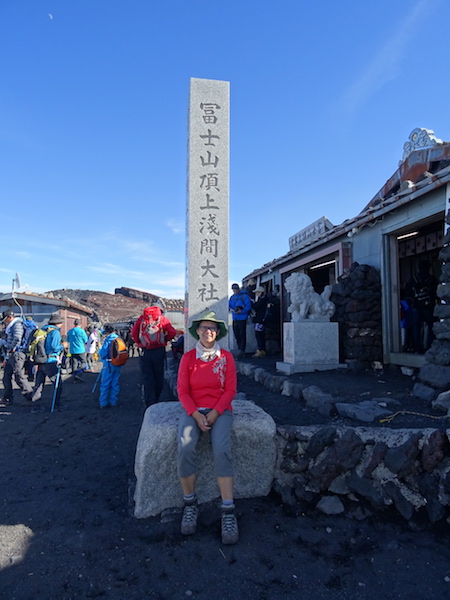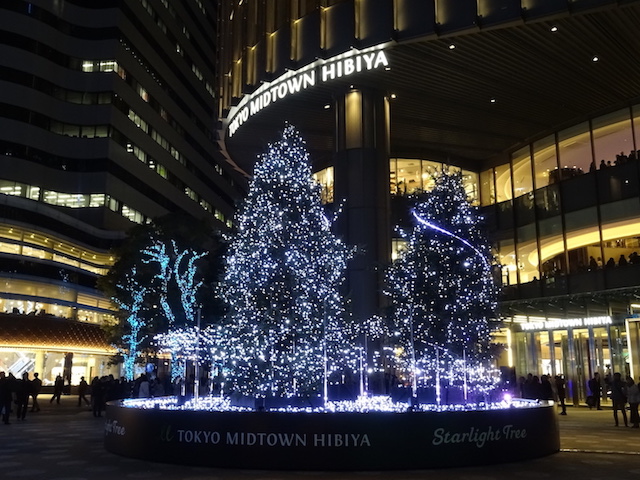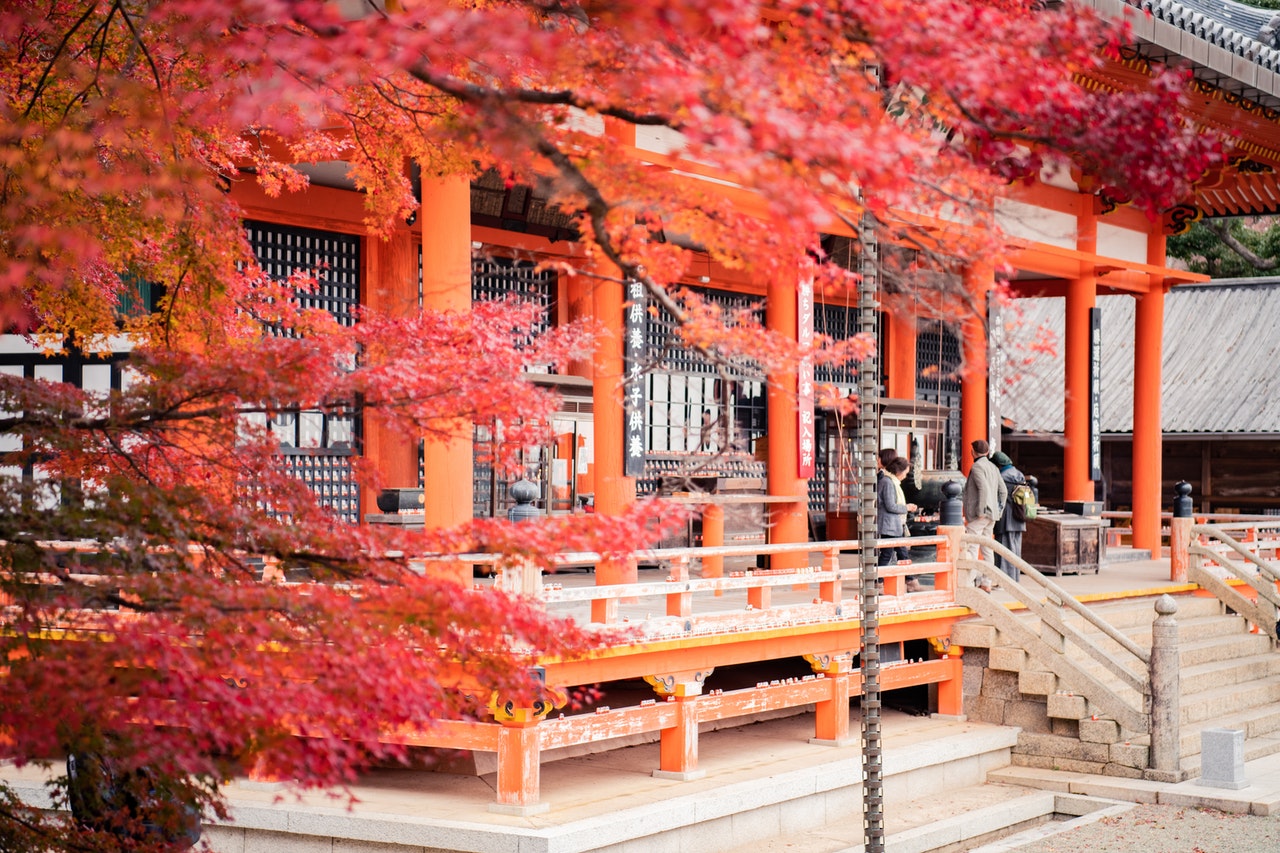Ever wondered what it would be like to live and teach in the world of manga, sushi and cherry blossom? When we asked our teacher Tamara what advice she would give to those considering a move, she responded: “don’t think twice, do it!” Read on to find out what makes it a place worthy of relocation…
Having both lived in Japan, I was delighted to hear about Tamara’s positive experience of teaching there. My love for Japan made it hard to resist adding my own two cents about life in such a remarkable part of the world.

Tamara at the summit of majestic Mount Fuji which locals refer to as Fuji-san.
1. Where are you teaching and what’s your school like? What made you choose that specific location?
Tamara: I’m teaching at an international school in Yokohama. It’s a rather small school, which means the relationships between colleagues, administration, parents and students are very friendly. Everyone is very helpful and I had no problems becoming a part of the community.
Read about the New Blog Manager’s, experience in Japan here.
2. How did you get your job? What was the process like?
Tamara: I got the job through Teacher Horizons. My advisor, Caroline, was very helpful and supportive the entire time.
Read our blog about other teacher experiences in other places around the world.
3. What is the city like? Is there an active expat scene? What do you do in your free time?
Tamara: Yokohama is a very pleasant place to live. It’s much quieter than Tokyo, however, Tokyo is only half an hour away. Many expats live in Yokohama including French, Americans, Australians to name just a few. In my free time, I explore the city and its surroundings. I go hiking, I visit places of interest, I go to the theatre, sometimes just for a walk to a nearby park.
Alexandra: With Tokyo being so nearby, I can attest it is worth the thirty-minute journey. Tokyo can feel daunting at first but once you get used to moving with the crowds you notice a sense of harmony. The train stations, especially Shibuya and Shinjuku, can feel quite overwhelming in their size so give your self plenty of time to find your way to the train! I also had some of the best food, notably Ramen noodles, in train stations as the quality remains as good as on the high street. The Shinkansen, bullet train, is such a convenient to travel the country. Travel is unbelievably efficient, regular and on time.
 4. Which tourist sites or must-visit places are nearby?
4. Which tourist sites or must-visit places are nearby?
Tamara: So many! Kamakura, Hakone, Tokyo of course, to name the most famous ones.
Alexandra: While I loved the Christmas markets in Yokohama and the Ramen Museum, I also really loved venturing out to other parts of the country as it is so easy to do so. Highlights of mine were the seaside towns on Izu Peninsular and a quaint place called Nikko, both within easy reach Tokyo.
5. What is the climate like? Is there any extreme weather? If so, how do you deal with it?
Tamara: Summer was hot and humid, autumn was gorgeous, winter is cold-but nothing extreme.
Alexandra: In Japan, you get to experience four distinct seasons. Winters do feel pretty freezing, as the buildings don’t retain heat, but the Japanese have a lot of pro-tips on how to keep warm without central heating systems. Perhaps the most celebrated is the heated blanket table, Kotatsu, which entire families sit around. It looks a bit like a coffee table with a duvet over the top. Another tip would be to don thermal everything- Japanese Heat Technology is used widely here. Springtime makes way for the infamous cherry blossom and results in boozy parties in the park to celebrate their short-lived beauty. Autumn is where the changing of leaves, called Koyo, can be marvelled upon. Summers are a good time to escape to the coast as the humidity in the city is quite intense.
6. What is the food like? Is international food available? Have you tried any unusual local dishes?
Tamara: Japanese cuisine is legendary. I’ve tried so many different things, also unusual. I never thought I’d eat sashimi, but tuna sashimi with avocado and tomatoes in the izakaya at Motomachi is simply wonderful. International food is also available, of course.
Alexandra: Izakayas are simple small bars which people pile into after work to have beers and small-bites. Usually, they sell starter like dishes such as Yakitori- chicken skewers. There are many around, they get packed out and have a vibrant atmosphere. People tend to move from one to another in mini-pub crawl fashion.
7. How is the culture different from your home culture? Have you experienced any culture shock?
Tamara: It’s different, but that’s what I wanted. All my experiences so far have been positive.
Alexandra: Culture shock is inevitable but if you have the right attitude, like Tamara, it becomes more exciting than overwhelming. Take with you a sense of curiosity and you will experience more wonder and awe than ever. It is a fascinating and unique place to be, embrace it.
8. What’s the cost of living like? Are you able to save money?
Tamara: I didn’t come to save money, I have come to enjoy and make the best of it.
Alexandra: While Japan can be on the pricey side, the salary usually reflects this. International schools. especially allow for a comfortable lifestyle. In Japan, they really enjoy getting out in nature, which is free! Onsen, Japanese outside baths, are really cheap and a great way to relax and unwind. A bowl of ramen will cost $7, fill you up and be absolutely delicious.
9. What’s the best thing about living and teaching in your chosen city? What have been your highlights so far?
Tamara: It’s different, it’s new, it’s a challenge. The best thing was to become a part of the community, to be accepted by students and to be able to overcome the initial shock.
10. Are there any drawbacks? What kind of person would not be suited to this location?
Tamara: I don’t see any drawbacks. Anyone who is willing to try something new would be able to get used to it.
Alexandra: I totally agree. Bring along a sense of curiosity and openness. They really value politeness and order in Japan so respect the harmony and you will get along just fine.



